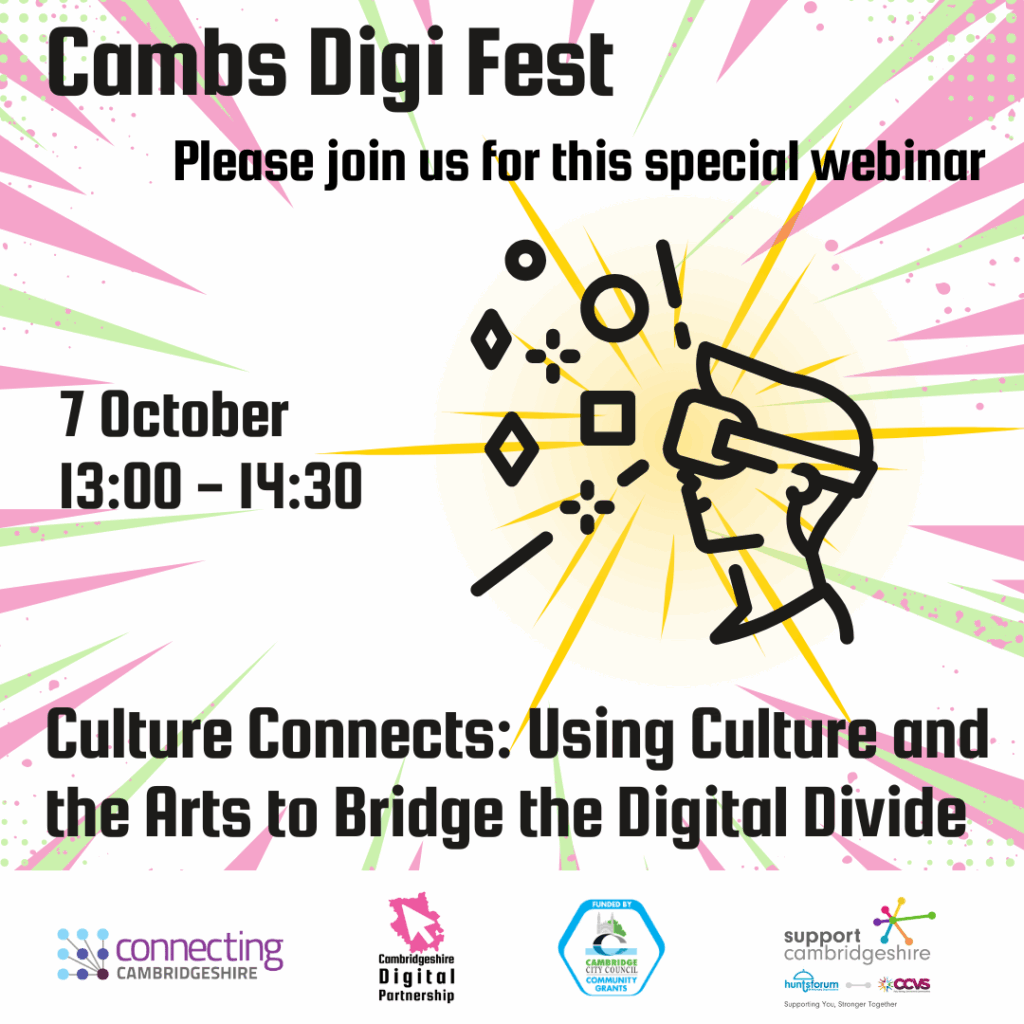Culture Connects: Using Culture and the Arts to Bridge the Digital Divide

The Cambridgeshire Digital Partnership and Connecting Cambridgeshire presented this special webinar as part of Cambs Digi Fest 2025. Thank you to everyone that attended.
This webinar explored the unique role that arts and culture can play in supporting digital inclusion—especially for individuals and communities who may face barriers to accessing or using technology. By drawing on creativity, storytelling, and cultural expression, organisations can create meaningful and enjoyable pathways into digital learning that build confidence, curiosity, and connection.
A special thank you to our wonderful guest speakers:
- Jennifer Rhodes, Assistant Digital Inclusion Officer at 100% Digital Leeds
- Dr Sharon Wagg, Lecturer in Library and Information Management at The University of Sheffield
- Emma Hindley, Dancer and Teacher from charity, Ascendance
- Michael Stevens, Senior Programme Manager – Digital Infrastructure at Connecting Cambridgeshire, Cambridgeshire County Council
- Roger Lilley, Trustee (Chair) at The Museum of Cambridge
Please find the recording of the presentations below, captions are available on YouTube.
Notes
Jennifer Rhodes from 100% Digital Leeds introduced their community-based model for digital inclusion. Rather than delivering skills sessions directly, they work with trusted local organisations to embed digital support into existing services. Jen emphasised the importance of using arts and culture as a “hook” to engage people who may be reluctant or anxious about digital technology
Emma Hindley from Ascendance, a dance-for-wellbeing charity, shared how their sessions support older adults and people with neurological conditions. Digital inclusion is subtly embedded through WhatsApp groups, YouTube videos, and hybrid Zoom classes. Emma highlighted how participants like Patrick gain confidence by sharing dance videos and engaging with social media, even without home internet access.
Dr Sharon Wagg presented findings from an Arts Council-funded research project exploring how arts and culture can motivate older adults to engage with digital tools. The study found that creative activities fostered social connection, confidence, and a sense of belonging, often leading to further digital engagement. Sharon emphasised the importance of person-centred, caring approaches.
Michael Stevens from Connecting Cambridgeshire discussed the Cambridge Open Ecosystem (CORE) project, which used extended reality (XR) to celebrate the Corn Exchange’s 150th anniversary. XR experiences were designed to be inclusive, with support for users of all ages and abilities. Feedback was overwhelmingly positive, with 100% of participants recommending the experience to others.
Roger Lilley from the Museum of Cambridge showcased the Capturing Cambridge project, a volunteer-led digital archive mapping local history through geolocated data, photographs, and oral histories. The platform enables global access to Cambridge’s heritage and invites contributions from individuals and community groups, making it a valuable tool for education and engagement.
Arts Council England shared their ongoing interest in the intersection of arts, culture, and digital inclusion and encouraged attendees to explore creative approaches and reach out with project ideas. There was praise for the diversity of examples shared—from dance and family history to XR—and enthusiasm for supporting similar initiatives nationwide.
During the Q&A, there was a question to Michael about accessibility challenges with XR technology. Michael explained that careful planning ensured inclusive access, with support teams and alternative options available. Another attendee followed up with a question about engaging participants, to which Michael described the structured registration and onboarding process used during the pilot.
One member reflected on the importance of using arts as a non-threatening entry point to digital engagement, especially for those wary of scams or data sharing. Another member highlighted the need to remember older adults who may never become digitally active, advocating for telephone-based programmes and outings to maintain inclusion.
The session concluded with a discussion on accessibility, transport barriers, and the importance of tailoring digital support to individual needs. Jennifer and Will reiterated their commitment to ensuring digital inclusion is embedded across communities.
Thank you again to all.
To keep up to date with our news please sign up to our newsletter: Subscribe to CDP Network